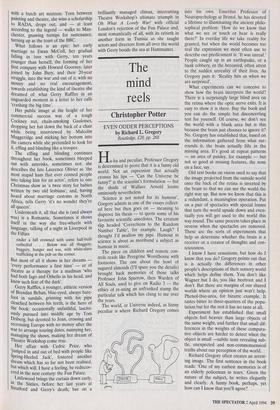The mind reels
Christopher Potter
EVEN ODDER PERCEPTIONS by Richard L. Gregory Routledge, £20, pp. 268 Ha-ha and peculiar, Professor Gregory is determined to prove that it is a funny old world. Not an expression that actually crosses his lips — 'Can the Universe be funny?' is the scientist's formulation — but the shade of Wallace Arnold looms ominously nevertheless.
'Science is not noted for its humour', Gregory admits in one of the essays collect- ed here but then goes on — meaning to disprove his thesis — to quote some of his favourite scientific anecdotes. The erratum slip headed 'Corrections to the Random Number Table', for example. Laugh? I thought I'd swallow my pipe. Humour in science is about as moribund a subject as humour in music.
The piece on children and remote con- trols reads like Peregrine Worsthorne with footnotes. The one about the bowl of sugared almonds (I'll spare you the details) brought back memories of those talks Professor John Sparrow, then Warden of All Souls, used to give on Radio 3 — the ethics of re-using an unfranked stamp the particular talk which has clung to me over the years. The world, or Universe indeed, as funny peculiar is where Richard Gregory comes into his own. Emeritus Professor of Neuropsychology at Bristol, he has devoted a lifetime to illuminating the ancient philo- sophical problem: 'How do we know that what we see or touch or hear is really there?' In everday life we take reality for granted, but when the world becomes too real the expression we most often use to describe our predicament is: 'It was unreal.' People caught up in an earthquake, or a bank robbery, or the bereaved, often attest to the sudden unreality of their lives. As Gregory puts it: 'Reality hits us when we are surprised'.
What experiments can we conceive to show how the brain interprets the world? There is a surprisingly large blind area on the retina where the optic nerve exits. It is easy to show it is there. Buy the book and you can do the simple but disconcerting test for yourself. Of course, we don't see the world with a blank area but is this because the brain just chooses to ignore it? No. Gregory has established that, based on the information gathered from what sur- rounds it, the brain actually fills in the missing area. It's good at repeat patterns — an area of paisley, for example — but not so good at missing features, the nose on a face, say.
Old text books on vision used to say that the image projected from the outside world onto the back of the retina is inverted by the brain so that we can see the world the right way up. But now we know that this is a redundant, a meaningless operation. Put on a pair of spectacles with special lenses that turn the world upside down and even- tually you will get used to the world this way round. The same process takes place in reverse when the spectacles are removed. These are the sorts of experiments that help us determine whether the brain is a receiver or a creator of thoughts and con- sciousness.
I know I have sensations, but how do I know that you do? Gregory points out that is is actually the differences in other people's descriptions of their sensory world which helps define them. You don't like Wagner but I do, you like beetroot and I don't. But there are margins of our shared worlds where an opinion just won't help. Phenol-thio-urea, for bizarre example. It tastes bitter to three-quarters of the popu- lation but for the rest it has no taste at all.
Experiment has established that small objects feel heavier than large objects of the same weight, and further that small dif- ferences in the weights of these compara- tive objects are harder to detect when the object is small —subtle tests revealing sub- tle, unexpected and non-commonsensical truths about our perception of the world.
Richard Gregory often creates an arrest- ing image. The first sentence in the book reads: 'One of my earliest memories is of an elderly policeman in tears.' Given the nature of the subject, he writes elegantly and clearly. A funny book, perhaps, yet how can I know that you'll agree?


























































 Previous page
Previous page